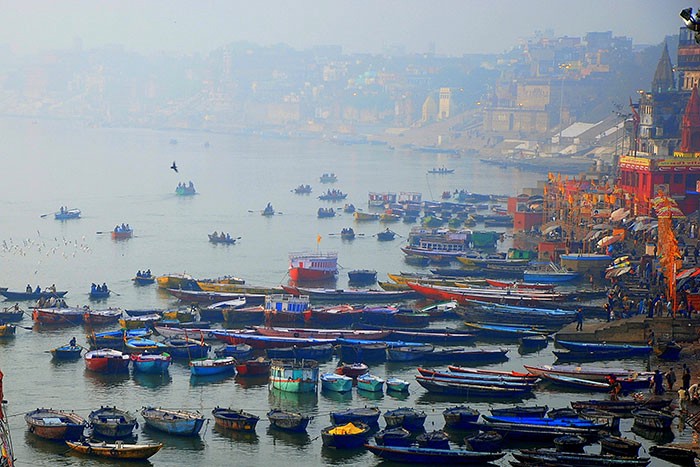Young People Need a Universal Basic Income. So Does the Planet.
A UBI would support youth entering the workforce and help address the climate emergency they’re stuck fighting.
The graduates of the class of 2020 face an uncertain future thanks amid the Covid-19 pandemic, recession, and climate change.
As a student in the University of Waterloo’s School of Environment, Resources and Sustainability, Maggie Chang worries about the climate: “Climate change quite literally threatens the livability of our planet.” But since the pandemic hit Canada in March, the 22-year-old has also been worried about her financial situation, and that of her peers. “We’re not in a place to find work right now and it feels like [the government doesn’t] have a good understanding of students,” she says. “Everyone should have a safety net to fall back on.”
She’s not alone in her concerns. The pandemic has resulted in 3 million job losses in Canada, which is projected to see unemployment levels unmatched in 70 years. In the US, over 14% of the working population was unemployed in April, and the World Bank says the global economy will shrink by 5% in 2020, making it the worst recession since World War II. Statistics Canada’s Labour Force survey for April stated: “COVID-19 has disproportionately affected Canada’s youth (15–24).” Among youth, the unemployment rate increased from 10% in February to 32% in April.
Another 22-year-old, Hannah Freedberg, graduated this year with a degree in forest conservation from the University of Toronto, and is anxious about job hunting. “I am entering the job market at the bottom of the food chain and not a lot to offer compared to people who have been working full-time,” she says. “As jobs become scarce, it’s scary.” A lot of her peers, who had already landed jobs have had their contracts reduced, or been laid off altogether.
In the Venn diagram of those most affected by Covid-19 and the climate crisis, Gen Z and millennials, like me, fall bang in the middle. We were born into a steadily warming climate, as well as precarious economic conditions that make it harder to succeed than it was for our parents and grandparents. And that was before the pandemic decimated the economy, which was already not working for young people.
Pre-Covid-19, I was working a full-time job to support my part-time journalism, which wouldn’t be economically sufficient on its own. In 2018, just over 1 million Canadian workers held multiple jobs, including 7% of workers in their 20s. On average, multiple-job-holders work 10 hours more per week than those with one job, leaving little time for much else.
But there is a policy solution that could help young people like Chang, Freedberg, and myself, and benefit the planet. The idea of a Universal or Unconditional Basic Income (UBI) has gathered a lot of attention during the pandemic. It’s been around for centuries, and while there’s disagreement about who first proposed it, a number of thinkers—like Johannes Ludovicus Vives, Antoine Caritat, Thomas Paine — suggested versions of a UBI in the 16th and 17th centuries. Its roots can be traced back to hunter-gatherer societies that supported all community members, regardless of their ability to work.
In the Venn diagram of those most affected by Covid-19 and the climate crisis, Gen Z and millennials fall bang in the middle.
The premise is that every citizen of a country receives a monthly income from the government, without any hoops to jump through or having to prove how it’s spent. (There is debate around if/how undocumented residents of countries with UBI could also get access.) A UBI would provide the safety net Chang speaks of, an income floor below which no one falls.
A UBI gets paid to everyone, but that doesn’t mean the rich get wealthier — their extra income would be clawed back through taxes. A major criticism of UBI is its cost, but wealth, inheritance, and carbon taxes have all been suggested as ways to pay for it. Plus, replacing welfare and unemployment insurance with a simple payment to everyone eliminates costly bureaucracy. But the main way a UBI would pay for itself is reducing poverty and its attendant costs, as experiments in Kenya, India, and Namibia have shown. In 2011, American political scientist Charles Murray calculated that a guaranteed income of US$10,000 per year would cost the US a trillion dollars less by 2028 than the existing welfare system.
Short-term measures
Several countries set up temporary income programs for individuals as part of larger Covid-19 relief packages, which bear a strong resemblance to UBI. The Canada Emergency Relief Benefit (CERB) gives C$2,000/month to Canadians who lost jobs because of the pandemic. Other countries gave one-time handouts, including the US, Japan, and Singapore.
In an April letter, the Pope wrote, “perhaps it is time for a universal salary.” At the height of the pandemic in Spain, the government committed to a basic income for its poorest people, and in June some families received their first monthly payments of up to US$790. This scheme is being called the biggest no-strings attached economic experiment yet. Scotland’s first minister, Nicola Sturgeon, also joined the choir, saying, “The case for [UBI] has been immeasurably strengthened by the crisis we’re living through.” In a bit of convenient timing, a report on the feasibility of a Citizens Basic Income pilot in Scotland was published in June.
The fact that young people need to work 60–80 hours a week doing multiple jobs is frankly a sign that our system was broken.
“Seeing how fast people went onto the CERB shows that we had a problem going into the pandemic,” says Floyd Marinescu, the Executive Director of UBI Works, a non-profit campaigning for a UBI in Canada. “The fact that young people these days are… in the gig economy and need to work 60–80 hours a week doing multiple jobs is frankly a sign that our system was broken.” A 2019 survey by the Angus Reid Institute found that 40% of millennials in Canada had participated in the gig economy in the past five years.
Says Chang: “With the rise of unpaid internships, contract jobs and all, I just think that young people are being exploited.” She also says she feels privileged to be on CERB. “But I just made the cut-off, so it does bother me that [it’s] a privilege at all.” She called in to a virtual town hall with the Member of Parliament for her federal riding, Don Valley North, to support the idea of a UBI to help vulnerable people who aren’t eligible for CERB or its student equivalent.
Without financial security, it’s hard for Chang to give her attention to things other than making rent and student loan payments. Like fighting the climate crisis. “Success,” she says, “means being able to make a difference.”
Broader impacts
According to Scott Santens — a frequent speaker on UBI and full-time advocate — a UBI would help with both of those concerns. “Having security alters your choices,” he says. “That’s why you see so much more community involvement among seniors who are on social security, who effectively have a basic income, and can actually be more engaged.”
Santens sees that change in his own life. He’s been crowdfunding his own income since 2016, enabling him to do more advocacy, writing, and public speaking. But UBI isn’t just a solution to our broken relationship with work and income. It can also help us heal our relationship with the planet. After just a few weeks of lockdown, we started witnessing the positive consequences our slowing down had on the natural environment. CO2 emissions decreased, pollution levels plummeted. The Ganga River in India — one of the world’s dirtiest — is now cleaner than the government’s expensive Clean Ganga project had managed to make it. We are seeing that the answer lies in slowing down.

A smog-darkened stretch of India’s Ganga River in Varanasi, photographed in 2019. The Covid-19 slowdown has reduced pollution in the notoriously dirty river.
A UBI could make this slowdown “the new normal” people keep talking about. By giving workers the power to turn down low-paying, low-satisfaction jobs, a UBI makes corporations less able to produce cheap goods and services, thereby reducing our rate of consumption. A UBI guarantees a viable livelihood that would allow workers to make employment decisions that don’t hurt the planet. The idea of so many workers losing jobs when the fossil fuel industry inevitably shuts down is painful. But an unconditional income would give them the option to train for another profession without putting their survival on the line. Through my years of reporting on the intersection of economics and climate change, I’ve learned that we need sustainable business practices, but we also need to give people freedom to make better choices.
Adopting a UBI could go hand-in-hand with a transition from capitalism to a system guided by Kate Raworth’s Doughnut Economics, a model Amsterdam is currently modelling its Covid-19 recovery on. Raworth dismisses the diagonal line of GDP growth as the key to economic progress and instead has conceived of a model that places balance at the centre of economics. Her model places human needs for housing, food, shelter, social justice at the centre of the doughnut, bounded by the planet’s limits on the outside. The idea is to adapt our systems until all those needs are met without overshooting environmental limits.
A way forward
The way I see it, mitigating the climate crisis and delivering justice to all vulnerable people are one and the same task. Our current predicament is that young people are maturing on a dirtier and warmer planet, which is set up to fail us with stagnant wages, high costs of living, precarious jobs. All this, while balancing our lives to make time for action for the environment.
UBI seems to be the missing piece of the puzzle. UBI experiments have been done around the world, including Canada, Finland, and India, and each time the results have pointed in the direction of success. Concerns like “where will the money come from?” and “it will make people lazy” have been tested and put to rest. The final results of the experiment from Finland were published in May, and participants experienced more financial security and less mentally stress. A Basic Income Guarantee experiment in Namibia in 2008 found an increase in participants’ income-generating economic activity from 44–55%; in India’s Madhya Pradesh state, results found that more people, particularly women, moved away from wage labour to work on their farms.
A UBI could make this slowdown “the new normal” people keep talking about.
Unfortunately, the experiments’ success in both countries don’t seem to have generated the political will to make the policy permanent. In Ontario, too, the experiment was looking successful before Premier Doug Ford repealed it. In fact, Santens argues the experiment was repealed because it was proving successful, and Ford didn’t want the evidence to support its continuation.
The climate crisis demands that we change our relationship with work and success. The current model of infinite production and consumption just isn’t possible on a finite planet. People may come out of this pandemic having realized what they truly want to do: garden, bake, or dedicate themselves to full-time activism. But if we revert to business-as-usual post Covid-19, many will have to return to meaningless jobs for salaries to keep them afloat, and the cycle of production and consumption will continue, with disastrous implications for the planet.
The pandemic has changed U of T grad Freedberg’s outlook. “I was going to look for an environment-related job before the world shut down. But now, it’s a different story,” she says. For the world, though, she sees two options. “We can go back to ‘normal’ before the pandemic, or we have the chance to change our normal.”
